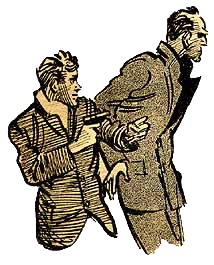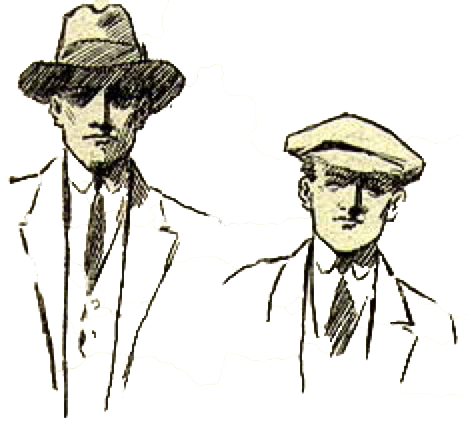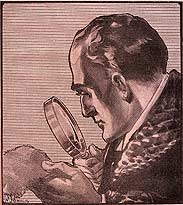Blake and Empire:
Mirroring the Zeitgeist
by Mark Hodder
 Within the now crumbling pages of THE UNION JACK, DETECTIVE WEEKLY, SEXTON BLAKE LIBRARY and countless other publications, Sexton Blake fought his way to and fro across the world in a ceaseless struggle against criminals and ne'er-do-wells. His wild adventures took him to some of the planet's remotest corners but always he would return to Baker Street in the heart of London, the hub of the British Empire. Even during his frequent visits to Darkest Africa (as recounted by Cecil Hayter up until the mid-1920s before Rex Hardinge then took over), Britain's capital never seemed far away. In truth, it wasn't; when the words 'Sexton Blake' first appeared in print Great Britain was at the peak of its power, spanning the globe as the most extensive empire in world history. The detective may not have been able to step out of a jungle straight onto his own doorstep but he could at least find an outpost where moral standards were upheld and upper lips were kept resolutely stiff.
Within the now crumbling pages of THE UNION JACK, DETECTIVE WEEKLY, SEXTON BLAKE LIBRARY and countless other publications, Sexton Blake fought his way to and fro across the world in a ceaseless struggle against criminals and ne'er-do-wells. His wild adventures took him to some of the planet's remotest corners but always he would return to Baker Street in the heart of London, the hub of the British Empire. Even during his frequent visits to Darkest Africa (as recounted by Cecil Hayter up until the mid-1920s before Rex Hardinge then took over), Britain's capital never seemed far away. In truth, it wasn't; when the words 'Sexton Blake' first appeared in print Great Britain was at the peak of its power, spanning the globe as the most extensive empire in world history. The detective may not have been able to step out of a jungle straight onto his own doorstep but he could at least find an outpost where moral standards were upheld and upper lips were kept resolutely stiff.
Sexton Blake's Golden Age coincided with the Empire's... at least, if you judge the latter's success in geographical terms. However, looked at from another perspective, Blake's creation in 1893 occurred at a point in history where countries such as Germany and France were beginning to make inroads on Britain's dominance in manufacturing and trade. He arrived just when the foundations of the Empire were beginning to weaken and his extraordinary fictional life ran parallel to its lengthy decline. During the 1920s, the decidedly shaky economic aspects of the Empire were compensated for by an all-out promotion of the benefits of Britishness... and who better to demonstrate them than that most British of Britons, Sexton Blake? Propaganda, it could be said, fuelled his popularity right through until the mid-1930s.
 However, with the '30s came the Great Depression and dark days of racial suspicion and suffering. Another terrible war loomed on the horizon and European countries now matched — and in some cases outstripped — Britain's industrial output. The British zeitgeist became much more concerned with what was occurring on its own doorstep than with what was happening on the other side of the planet. Sexton Blake reflected this attitude with a decade and a half of remarkably withdrawn stories in which petty criminals replaced the great master-crooks of yore and where the factual minutia of day to day life surplanted the big ideals. Vengeful eccentrics and exotic locales were replaced by absconding tenants and burgled garages. Besides, by now the authors who had created Blake's super-opponents were dying of old age or being killed on the Front.... and the fictional super-villains had been surplanted by real ones: Hitler, Mussolini, Stalin.
However, with the '30s came the Great Depression and dark days of racial suspicion and suffering. Another terrible war loomed on the horizon and European countries now matched — and in some cases outstripped — Britain's industrial output. The British zeitgeist became much more concerned with what was occurring on its own doorstep than with what was happening on the other side of the planet. Sexton Blake reflected this attitude with a decade and a half of remarkably withdrawn stories in which petty criminals replaced the great master-crooks of yore and where the factual minutia of day to day life surplanted the big ideals. Vengeful eccentrics and exotic locales were replaced by absconding tenants and burgled garages. Besides, by now the authors who had created Blake's super-opponents were dying of old age or being killed on the Front.... and the fictional super-villains had been surplanted by real ones: Hitler, Mussolini, Stalin.
In the wake of World War II, and as British territories dwindled, it seemed as if the detective was losing his way; his character and the British Empire had been indivisible. Now there was no Empire... so who was Sexton Blake? There was no longer room in the world for a man who could utter the following words:
“I only thought of them as white men, men of my own race,” said Blake quietly; “and the white man must always be upheld if the white man has to remain as rulers of the world.”
— THE RAJAH’S REVENGE SEXTON BLAKE LIBRARY 1st Series 4 (1915)
That racism, intrinsic to the concept of empire, became unacceptable after the Holocaust. Blind acceptance of superiority had been rightfully banished from the ingredients that make up cultural identity. Now, something new was needed.
Rock 'n' roll saved Sexton Blake and saved Britain. The country had been so badly fractured by the war and the loss of its extensive overseas territories that, culturally and metaphorically speaking, it required medical attention. The shot in the arm came from America; a shiny, bright, exciting, gung-ho new culture which, to the youngsters of the Sceptred Isle (and the sceptre really needed a polish), surrounded as they were by the dour remains of their parents' war, was hugely inspiring. Blake bought into it; he became younger, grittier and much less rigid.
As the 1950s turned into the 1960s, led by the young and by the entertainment media, an Empire-free British culture was reborn. Okay, so everything was perhaps rather more superficial and principles were there to be questioned rather than adhered to... but at least Britain had a 'character' again: it was 'cool'.
 Ultimately, though, this new world wasn't for Sexton Blake. He had always, always, been a man who upheld standards and, as such, he could never achieve 'coolness'. By the 1970s, British behaviour, as repeatedly demonstrated by supposedly respectable figures in positions of authority, had slipped into a mire of sleaze. The great detective couldn't possibly support that. He was a man who knew the difference between Right and Wrong. Unfortunately, by this point, the public was more enthused by heroes in whom the distinction was less clear. The brutality and bed-hopping of James Bond would never do for Blake.
Ultimately, though, this new world wasn't for Sexton Blake. He had always, always, been a man who upheld standards and, as such, he could never achieve 'coolness'. By the 1970s, British behaviour, as repeatedly demonstrated by supposedly respectable figures in positions of authority, had slipped into a mire of sleaze. The great detective couldn't possibly support that. He was a man who knew the difference between Right and Wrong. Unfortunately, by this point, the public was more enthused by heroes in whom the distinction was less clear. The brutality and bed-hopping of James Bond would never do for Blake.
The Baker Street detective adapted to the times... but only in times of Empire — now the Empire was gone and Sexton Blake simply petered out and vanished with it.
He leaves behind an intimate social history of how people lived their lives during the peak and down-slope of Britain's reign. Yes, it's fiction; yes, it's melodramatic; yes, characters are most often hastily drawn and the plots are unbelievable... yet, all that aside, the stories frequently and with crystal clarity mirror the prevalent attitudes, concerns and ideals of the time. They also contain remarkable items of historical trivia such as the fact that right up until the late-1920s many of London's roads were made out of wood. The tales magnify the importance of little things; a Sexton Blake adventure can reveal the social importance of hats better than any history book. This all adds up to what might be termed a 'Chronicle of Zeitgeist'... and it's absolutely fascinating.
